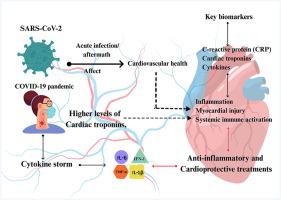A comprehensive review on the interconnection of C-reactive protein, cardiac troponins, and cytokine storm in cardiovascular manifestations of COVID-19
引用次数: 0
Abstract
Background
The COVID-19 pandemic, caused by severe acute respiratory syndrome coronavirus 2 (SARS-CoV-2), has been associated with substantial cardiovascular morbidity and mortality, both during acute infection and in the post-recovery phase. Identifying and understanding key biomarkers is critical for elucidating underlying mechanisms, guiding risk stratification, and informing therapeutic strategies.
Objective
This literature review was conducted with the aim to synthesize current evidence on the role of major cardiovascular biomarkers C-reactive protein (CRP), cardiac troponins, and pro-inflammatory cytokines in the pathophysiology, prognosis, and long-term sequelae of COVID-19.
Methods
The authors have gone through various databases such as - PubMed, Scopus, Web of Science, and Google Scholar. This review evaluates peer-reviewed clinical and mechanistic studies examining the association between COVID-19 between January 2020 to June 2025 with keywords and MeSH terms such as “C-Reactive Protein” OR “CRP” and “Cardiac Troponins” or “Troponin I″ or “Troponin T″ and “Cytokine Storm” and “COVID-19″ or “SARS-CoV-2″ and “Cardiovascular Complications” and cardiovascular complications, with a focus on inflammatory and myocardial injury biomarkers.
Results
CRP, an acute-phase reactant and sensitive indicator of systemic inflammation, is markedly elevated in severe COVID-19 and correlates with endothelial dysfunction and disease severity. Cardiac troponins, highly specific markers of myocardial injury, are significantly increased in affected patients, predicting adverse clinical outcomes and higher mortality risk. Elevated levels of interleukin-6 (IL-6), tumor necrosis factor-alpha (TNF-α), and other cytokines characteristic of the COVID-19–induced “cytokine storm” play a pivotal role in the pathogenesis of acute cardiac injury, myocarditis, arrhythmias, and thromboembolic events. Persistent elevation of these biomarkers in some patients after acute illness suggests ongoing myocardial stress and chronic inflammation, potentially contributing to post-acute sequelae of SARS-CoV-2 infection, including long COVID and late cardiovascular complications.
Conclusion
Biomarkers such as CRP, cardiac troponins, and cytokines are integral to understanding the cardiovascular impact of COVID-19, offering prognostic value for both acute and long-term outcomes. Ongoing research into targeted anti-inflammatory and cardioprotective therapies holds promise for mitigating these complications and improving patient survival and quality of life.

c反应蛋白、心肌肌钙蛋白和细胞因子风暴在COVID-19心血管表现中的相互作用综述
由严重急性呼吸综合征冠状病毒2 (SARS-CoV-2)引起的COVID-19大流行与急性感染期间和恢复后阶段的大量心血管疾病发病率和死亡率相关。识别和理解关键的生物标志物对于阐明潜在机制、指导风险分层和告知治疗策略至关重要。目的本文献综述旨在综合目前关于主要心血管生物标志物c反应蛋白(CRP)、心肌肌钙蛋白和促炎细胞因子在COVID-19病理生理、预后和长期后遗症中的作用的证据。方法检索PubMed、Scopus、Web of Science、谷歌Scholar等数据库。本综述评估了同行评审的临床和机制研究,研究了2020年1月至2025年6月期间COVID-19与关键词和MeSH术语(如“c -反应蛋白”或“CRP”、“心肌肌钙蛋白”或“肌钙蛋白I″”或“肌钙蛋白T″”、“细胞因子风暴”、“COVID-19″”或“SARS-CoV-2″”和“心血管并发症”和心血管并发症)之间的关联,重点是炎症和心肌损伤生物标志物。结果scrp(急性期反应物,全身性炎症敏感指标)在重症COVID-19患者中显著升高,并与内皮功能障碍和疾病严重程度相关。心肌肌钙蛋白是高度特异性的心肌损伤标志物,在受影响的患者中显著升高,预示着不良的临床结果和更高的死亡风险。白细胞介素-6 (IL-6)、肿瘤坏死因子-α (TNF-α)等细胞因子水平升高是新冠肺炎诱导的“细胞因子风暴”的特征,在急性心脏损伤、心肌炎、心律失常和血栓栓塞事件的发病机制中发挥关键作用。在一些急性疾病后的患者中,这些生物标志物持续升高表明持续的心肌应激和慢性炎症,可能导致SARS-CoV-2感染的急性后后遗症,包括长时间的COVID和晚期的心血管并发症。c反应蛋白、心肌肌钙蛋白和细胞因子等生物标志物对于了解COVID-19对心血管的影响是不可或缺的,对急性和长期预后都有预测价值。正在进行的针对抗炎和心脏保护治疗的研究有望减轻这些并发症,提高患者的生存率和生活质量。
本文章由计算机程序翻译,如有差异,请以英文原文为准。
求助全文
约1分钟内获得全文
求助全文
来源期刊

Advances in biomarker sciences and technology
Biotechnology, Clinical Biochemistry, Molecular Medicine, Public Health and Health Policy
自引率
0.00%
发文量
0
审稿时长
20 weeks
 求助内容:
求助内容: 应助结果提醒方式:
应助结果提醒方式:


